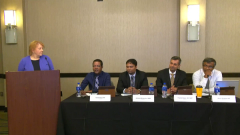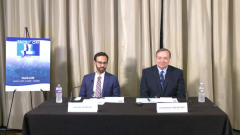
Cross Q&A: Arterial Occlusive Events With Ponatinib in the PACE Trial
Following a review of the retrospective analysis of PACE, experts reflect on its importance in understanding the risk of arterial occlusive events with ponatinib.
Episodes in this series

Transcript:
Judy Schreiber, PhD, RN: Thank you so much for the great presentation. Any other comments or questions?
Prashant Kapoor, MD, FACP: Abhishek, I have a question not knowing much details about this kind of study before. Wouldn’t this be somewhat self-fulfilling to an extent if there is a central adjudication and there is this requirement for concordance? Obviously in the decision, there’s a lower likelihood of everyone agreeing to that. How is that taken into account when they’ve looked at the results?
Abhishek Mangaonkar, MBBS: I think that [in] these types of analysis , those biases are always there. I think that it goes to the point where I think the main focus of the study was not to show that ponatinib is safe from vascular standpoint. We all know that it does have vascular toxicity, it has intimal changes, we’ve shown that. I think the main point of the study was [to show] how much of the vascular events are truly associated with ponatinib, and how many of those adverse events are just the risk profile of the patient in general. That’s what they try to separate out. Retrospective comparisons always have a limitation. If you go back to the data of the trial, there’s always a bias of what adverse events you’re actually considering for analysis. That’s also a bias there. But with all these limitations, I think it’s still good analysis to help understand how we look at the risk factors for patients with ponatinib.
Adeel Khan, MD, MPH, MS: Thank you, Dr Mangaonkar. That was really an interesting paper. [It] does make one question clinical trial sometimes. With the caveats of basically what ends up being a 1-tailed comparison here, in that they were looking for lower rates, not higher, not reevaluating every single event. It was high enough to make me think of what we already know of TKIs [tyrosine kinase inhibitors]. If we look some of the VEGF [vascular endothelial growth factor] TKIs in the RCC [renal cell carcinoma] space, like axitinib or cabozantinib, that these are vascularly potent agents. And this really does underscore that to me. This is more of a comment than a question.
Abhishek Mangaonkar, MBBS: Absolutely, I think we know that, and I think it’s more so with ponatinib than other TKIs. That’s also something. As Dr Begna said, I think even asciminib has some of those adverse events, and we’ve seen it with other TKIs as well, pulmonary hypertension, so on and so forth. Erythemas with other TKIs. I think [it’s] individualized medicine at the end of the day. I think the drugs have some concordance with the [adverse] effects, but there are quite unique [adverse]effects that go along with the specific TKIs. So that’s a good point.
Kebede Begna, MD: Actually, it seems that the group might know about this result when they designed the OPTIC trial [NCT02467270]. If you remember…, they have excluded those patients with diabetes, hypercholesterolemia, hypertension, and so on. That’s why when the result came, they did not get the approval of the papers. They might have some inside information telling that if you start [everybody on 45 mg], you end up having those vascular events.
Transcript edited for clarity.
Newsletter
Stay up to date on recent advances in the multidisciplinary approach to cancer.









































